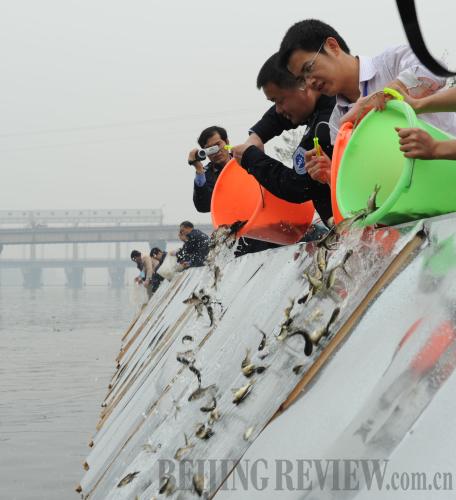|
 |
|
AQUATIC CULTIVATION: On April 1, the first day of the fishing ban on the Pearl River, fishermen in Guigang City, Guangxi Zhuang Autonomous Region, put 1.5 million fish fries into water (YU XIANGQUAN) |
"Two months are far from enough for increasing output," said He Yayou, a 65-year-old fisherman in Zhaoqing City, Guangdong Province. "It would take at least a five-year ban to increase fishing output significantly."
His words are based on his own experience. "The biggest fish I caught in the river weighed 35 kg, but that was 30 years ago," said He. "It is impossible to catch such a big fish now. Some people catch very small fish and take them to market for sale. When more small fish get caught, there is no way for us to catch big ones."
He said severe punishment of people fishing with electric devices is a must for the fishing control. "The devices cost them about 40,000 yuan ($6,154). In order to get the money back, they make full use of them and kill a lot of fries as well as big fish and caused the greatest harm to the fishing industry," said He.
In He's community, there are 50 fishing families with 70 fishing boats.
"Most of the fishing people live a hard life due to the sharp decline of fish in the water. Many young people in the community don't want to continue this kind of life and chose to go to big cities to earn a living," said He.
Subsidies are another concern of fishermen.
"I can't do anything else except for fishing," said Chen Zhisheng, another fisherman from Zhaoqing. "I don't know what to do during the fishing ban period and how we make a living."
As many of the 100,000 fishermen who will be affected by the ban have no other skills, local governments have given subsidies to fishermen who live on boats and make their living only by fishing, to make up for any losses, but the standards of subsidy vary in different places.
In Hunan Province, nearly 1,600 fishermen who live on boats received 10,000 yuan ($1,538) to 20,000 yuan ($3,076) each from the government to settle on the riverside.
On April 10, the government of Foshan City, Guangdong Province, announced each of the 1,880 locally registered fishing boat could get 2,000 yuan ($307) each as a subsidy during the two-month fishing ban period.
At the same time, consumers found prices of the aquatic products increased with the fishing ban. For example, last April, the price of shrimp was about 40 yuan ($6.15) per 0.5 kg in Foshan, but now it is 10 to 20 yuan more than that.
"There are many reasons for the price increase in aquatic products, such as inflation and weather," said Kuang Juming, Manager of Foshan Zhongnan Agricultural Products Exchange Center. "I think the inflation is the main reason for the price hike."
In 2010, the total supply of aquatic products in Foshan was 565,000 tons, while local products accounted for only 6,780 tons. "So the fishing ban won't affect the supply of the aquatic market that much," said Kuang. |
